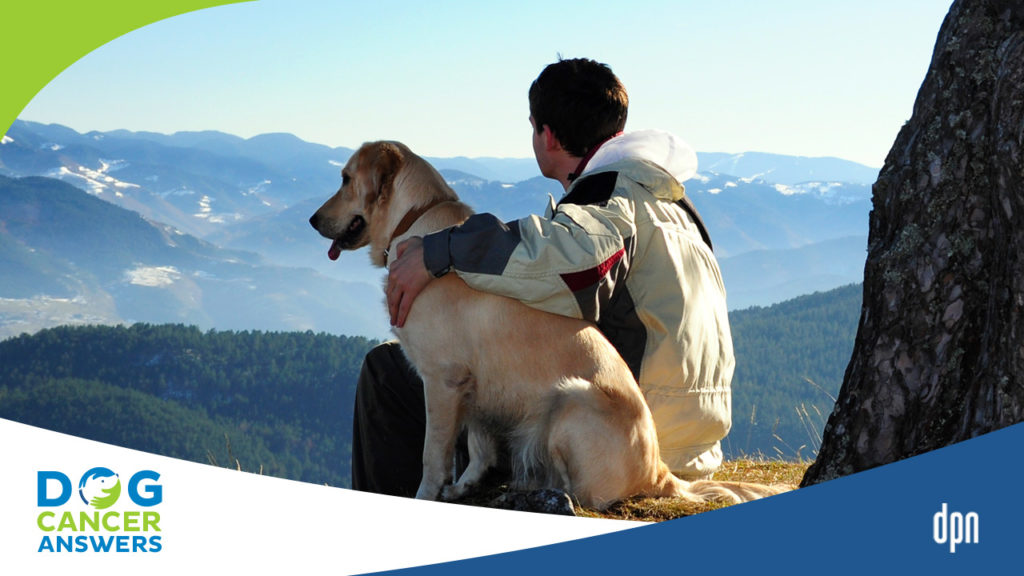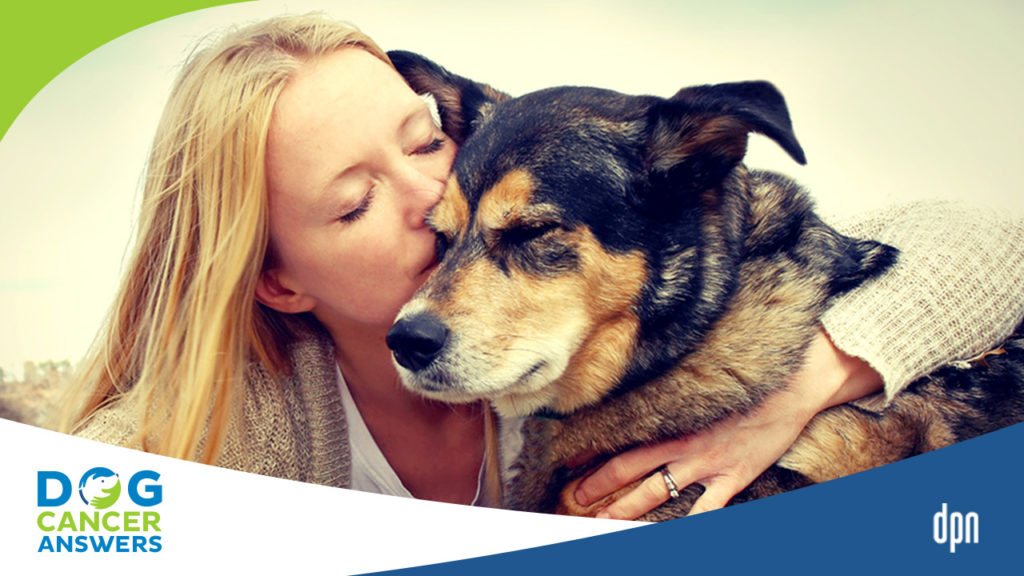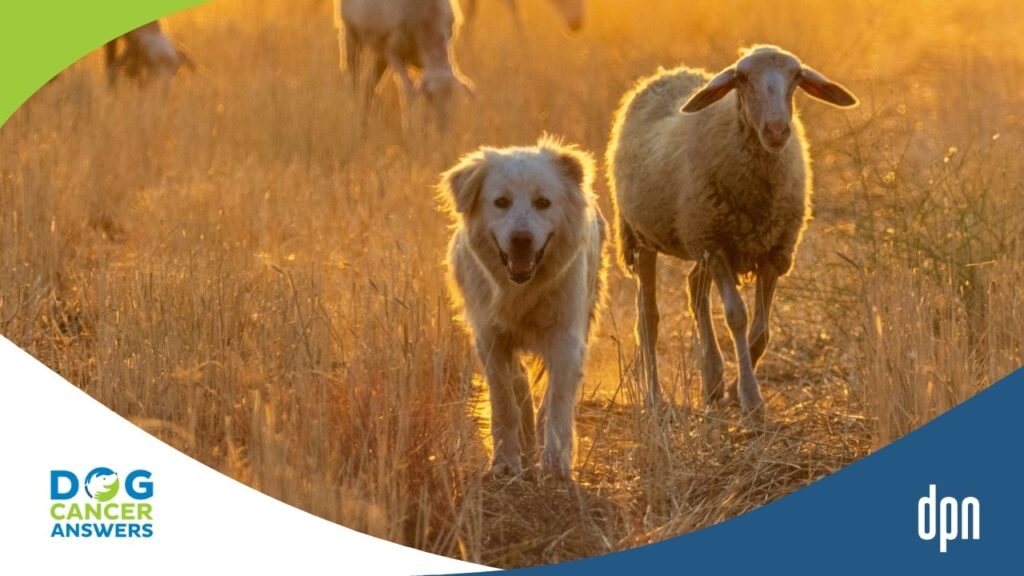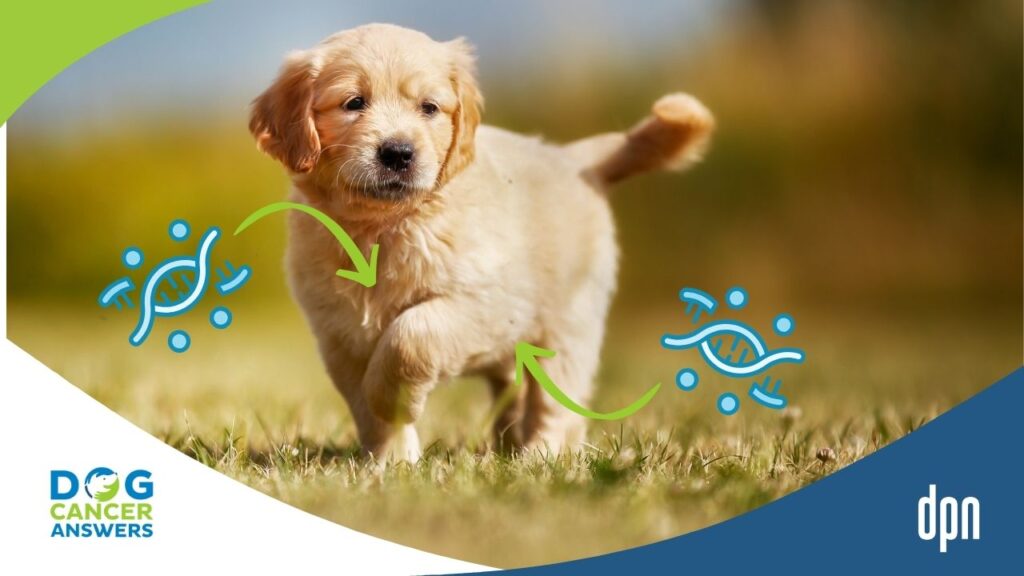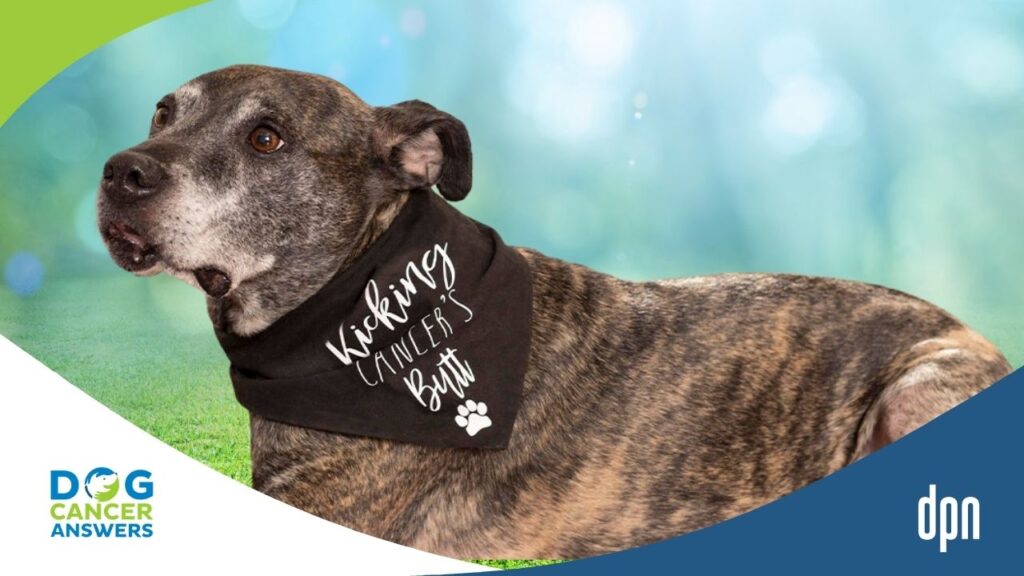EPISODE 131 | RELEASED September 27, 2021
The X Factor In Dog Cancer: Your Personality Type | Molly Jacobson Deep Dive
There is no “one right way” to treat dog cancer, and many factors affect treatment plans and strategies. That makes knowing who YOU are, and identifying YOUR priorities critical.
SHOW NOTES
What is your priority when choosing treatment options for your dog with cancer? Whether you are an Action-oriented go-getter, Comfort-first caretaker, or someone who likes to Balance all of your options, your personality type impacts how you approach these important decisions.
According to Dr. Demian Dressler’s Dog Cancer Coping Guide, dog lovers tend to fall into three personality categories when addressing these concerns and making treatment decisions:
- A for Action is determined to help his or her dog through treatment side effects to hopefully achieve remission
- B for Balance generally want minimal side effects or really good odds of success.
- C for Comfort focus on treatment options that relieve symptoms and keep their dogs happy.
Which type are you? The answer to this question will give you clues about which strategies and treatments will work best for your specific dog and specific situation.
Molly Jacobson, editor of The Dog Cancer Survival Guide, joins us to discuss personality types.
[00:00:00] >> James Jacobson: Today’s show is brought to you by the bestselling book The Dog Cancer Survival Guide: Full Spectrum Treatments to Optimize Your Dog’s Life Quality and Longevity. It’s available everywhere books are sold in both paperback and digital editions and on the publisher’s website at DogCancerBook.com. Use coupon code PODCAST on that website to get 10% off the Dog Cancer Survival Guide today.
[00:00:31] >> Molly Jacobson: I really think it’s important to be able to look back and say, I did the best, and I made the best choices given the circumstances and what my options were at the time. So in order to do that, taking just a few minutes to kind of sit down and think about, "Who am I?" will help you to anchor yourself so that five years, 10 years from now, if you made your decisions based on who you really are, then you’re much less likely to look back and regret your choices.
[00:01:01] >> Announcer: Welcome to Dog Cancer Answers, where we help you help your dog with cancer. Here’s your host, James Jacobson.
[00:01:09] >> James Jacobson: Hello friend, and thank you for joining us today here on Dog Cancer Answers. Today, we are joined by Molly Jacobson – yes, same last name as me because Molly is my wife – but more importantly for today’s show, she is the editor of the Dog Cancer Survival Guide. Molly is joining us to talk about your personality and how your personality relates to making decisions about cancer treatment. Molly Jacobson, thank you for joining us today.
[00:01:42] >> Molly Jacobson: Thank you for having me here.
[00:01:45] >> James Jacobson: So today we are going to begin a journey to help people better treat dog cancer by first starting with understanding their own personality type.
So Dr. Dressler often says that just like when you get on an airplane and they say in the event of an emergency, please put on your mask first, and then be able to assist children and other people who need help with their masks – that’s really what this is all about. And its genesis comes from his Dog Cancer Coping Guide.
But in order to understand your personality type, we are going to share with you what the different A, B, and C personality types are and which one you are. So on this episode, let’s do an overview of the personality types. They’re called Type A, Type B, and Type C and they’ve been that way since the book first came out in 2008, but today you are going to make a slight refinement on the A, the B, and the C.
[00:02:53] >> Molly Jacobson: Well, over the years, it’s occurred to me that Type "A" people are action-oriented, and "B" people are balance-oriented, and "C" people are comfort-oriented. So that’s where I’ve sort of expanded, given those letters full words.
[00:03:10] >> James Jacobson: Okay. Action, Balance, and Comfort. So what does that mean, and how do you figure out if you are an A, B, or C?
[00:03:18] >> Molly Jacobson: Okay. So the first thing to know is that the only reason to even think about your personality type at all is because it drives your decisions. It is really, really helpful when you know what your goal is overall on a kind of meta level to come up with a list of questions to ask your veterinarian, to make the actual decisions based on what your overall goal is for you and for your dog, and to really help to shape your whole cancer journey.
I think it’s actually one of the first things people should do, is really sit there and think, "What’s my goal here?" Some people have a dizzying array of options. They go to an oncologist and they get: you can do surgery, you can do radiation, you can do chemo, and we want to do a combination, or we could do this other thing that’s just surgery with a followup of radiation six months from now. There’s all of these tests that can be done, then there’s diet changes to be made, there’s a whole bunch of supplements to consider. And then other people have very few options given to them by their conventional veterinarian, and they still have all of these supplements to consider and dietary changes.
And there’s also lots of lifestyle changes that can be made. So having something that helps you to tailor and narrow down all of those choices and make them based on what’s really best for you will help you to look back on this time, say five, 10 years from now with no regrets. And that’s always in my mind the goal.
[00:04:51] >> James Jacobson: Have no regrets, be able to look back and say, I did the right thing, or at least I don’t regret not having done X or I do regret doing Y.
[00:05:01] >> Molly Jacobson: I really think it’s important to be able to look back and say, I did the best, and I made the best choices given the circumstances and what my options were at the time.
So in order to do that, taking just a few minutes to kind of sit down and think about, "Who am I?" will help you to anchor yourself so that five years, 10 years from now, if you made your decisions based on who you really are, then you’re much less likely to look back and regret your choices. All of us regret our dogs having cancer.
All of us will regret our dog’s passing, whenever that does happen. We will never be able to look back on that without regret. But what we want is to be able to look back with no regrets on our own decisions, and we always have to have compassion for ourselves. So this is a way of sort of orienting yourself immediately to who you are in relationship to your dog so that you can make the best treatment decisions now that later you will be able to look back on and be, maybe not happy about, but content with.
[00:06:04] >> James Jacobson: Okay. And again, this has been really the focus since 2008, when the first edition of the Dog Cancer Survival Guide came out. So let’s talk about personality Type A. You know you’re an A if…
[00:06:17] >> Molly Jacobson: You know you’re an A if everything that your veterinarian says is possible to do, you want to do it.
[00:06:25] >> James Jacobson: I.e.: Action.
[00:06:26] >> Molly Jacobson: Yeah. Yeah. I don’t have the book in front of me, so I’m going to paraphrase this. So Type A’s are people who focus on longevity. They want their dog to live as long as possible.
[00:06:40] >> James Jacobson: Maximum number of days.
[00:06:41] >> Molly Jacobson: Yeah, you know, their vet says six months, they’re like, 12. You know, like, I, I want my dog to live as long as possible. My dog’s got a fighting spirit and he’s going to make it, and I’m going to be there every step of the way, cheering him on. Now, all of us love our dogs and all of us want our dogs to be happy and healthy. Type A’s are willing to tolerate some side effects if the treatment is likely to result in a longer life. So some people wrongly assume that chemotherapy is going to result in a lot of side effects. Typically the doses used in dogs are not high enough to actually induce side effects in most dogs, and when they do happen, veterinarians tend to, oncologists tend to dial those doses back so they don’t happen in the next round. But some people look at chemo and assume, oh my God, there’s going to be all these side effects like there are for humans and they discount it right away and say, I don’t want that because I don’t want the side effects. A Type A person is going to say, Hey, it’s usually not causing side effects, and when they do happen, they’re manageable, and we can always adjust down. So I’m going to go for it. They’re much more willing to tolerate the risk of side effects than the other two types are.
[00:07:59] >> James Jacobson: Okay. A for action. B is for balance.
[00:08:04] >> Molly Jacobson: Yeah.
[00:08:04] >> James Jacobson: So what is a Type B person?
[00:08:06] >> Molly Jacobson: Oh, so a Type B also really wants longevity.
That is definitely their goal. They also really want life quality. So sometimes Type B might be in the same situation as a Type A, and be perfectly happy to tolerate a few side effects from a treatment. But then if they go on for too long or if they get severe, they’re done. Life quality really matters to a Type B and at some-
[00:08:32] >> James Jacobson: Define life quality.
[00:08:33] >> Molly Jacobson: Okay. So life quality is basically: is your dog having a good life? Is your dog eating? Peeing and pooping, sleeping, walking without pain, playing, going for walks? Having the life that they are accustomed to living? In my mind, life quality is about are they living the way a dog wants to live, which is pain-free, easily able to eliminate with no issues, mobile, affectionate, playful, vigorous. And as time goes on, you know, age will take its toll on any given dog. Cancer sometimes has real life quality problems in some cancers, but in others, they might actually not be symptomatic when you bring them into the veterinarian. Like a lot of dogs with mammary cancer, for example, you find the lump, but the dog’s fine from a life quality perspective. And then that person, that B person might be like, well, if this is a really slow growing tumor, do I really want to remove it now and put them through surgery when their life quality is really good? What if it’s not that aggressive, what if it doesn’t spread?
You know, some of those tumors are actually very slow growing and they don’t metastasize and it can take two and a half, three years before they see anything. So someone like a Type B might say, I don’t know if I want to do surgery right now. I might wait. Now a Type B might also say, yeah, let’s do surgery because my dog’s really healthy and can tolerate it well, and I know she’s going to recover fine afterwards.
So it’s sort of all of these things they’re balancing all the time. Like there’s no way to tell ahead of time what any of these types are going to do, but B’s for sure are like always assessing: where am I? Where’s the balance? Am I losing a lot of life quality in favor of longevity? Or do I need to start sacrificing some longevity in order to make sure life quality stays high?
[00:10:28] >> James Jacobson: And what about a Type C for comfort?
[00:10:31] >> Molly Jacobson: So a Type C for comfort right off the bat is not really interested in longevity. They want their dog to live for as long as possible, but not at the expense of life quality. They are the people who are saying, I’m so afraid she’s in pain. I am so afraid, you know, that they have a day of suffering. And they want a lot of reassurance and a lot of comfort measures usually right upfront, because they want to make sure that their dog never suffers.
[00:11:02] >> James Jacobson: We are going to take a short break here. And when we get back, let’s explore that idea a little more.
Welcome back. Now, when we’ve been talking about suffering, as you’ve been talking about suffering, you talk a lot about suffering as a result of chemotherapy. You talk about side-effects and Type A, you talk about balancing that and Type B, and you talk about avoiding that and Type C. Are there other negative things other than chemotherapy that you would lump to the negative?
[00:11:37] >> Molly Jacobson: Sure. Well, the side effects from surgery can be quite profound, right? Like, and most dogs who have cancer have a surgery to remove it because the best way to deal with cancer at this point is still to cut it out of the body. If you can get rid of it, then you have a much higher chance of it not affecting your dog in the longterm.
So most dogs are facing some sort of a surgery, especially if it’s caught earlier. So the risks for surgery include anesthetic risks on the table, which, you know, are not super, super common, but not rare. And then the risk of clotting problems. There’s the recovery period. I think a lot of people are surprised at how long it takes for their dog to recover after surgery. That 10 to 14 days of wound healing that happens before you get the staples or the stitches out, that is like, your dog is immobilized.
They’re wrapped up. You can’t let them run around at all. They have to be very carefully watched. The area has to be kept clean. If the stitches pull, you may have to get wound care from your veterinarian and go back. There’s a lot of labor associated with it. And at the same time, I don’t know about most people, but I know for example, when Kanga went through her epic surgery, she was mad at us for like 48 hours.
She just was like staring at us like, why do I feel so bad? And why aren’t you doing anything about this? So for me, I mean, I remember actually having the thought the second night where she was not able to fully rest because she was in so much pain and every little move she made twinged it, and I actually had the thought, I don’t know if I would make her go through surgery ever again, because this is so hard on her emotionally to be in pain. Now a couple of days after that she was running around, and I had to keep her from running around in order to keep from, the stitches from pulling. So it, is 48 hours of stink-eye from your dog intolerable? It depends on what personality type you are.
[00:13:51] >> James Jacobson: Okay. So once you have a sense of whether you’re A, B, or C…
Well I guess that’s the question. Do you have to be one type over the others? Like, is there always going to be a predominant type for each person?
[00:14:05] >> Molly Jacobson: That’s an interesting question. This has definitely been something I’ve been wondering myself because for Roo, for example, our dog Roo who passed a few weeks ago, I was much more of a Type C person. And Kanga I used to think I was a Type B person, but now I’m kind of a Type A person ’cause I’ve seen how much she fights when she’s sick to get better. So I’m not sure that it’s really about the person as much as it’s about you and your dog together in relationship.
[00:14:35] >> James Jacobson: So with one dog, you can be a C – Roo – and with one dog, you can be an A – Kanga.
[00:14:42] >> Molly Jacobson: I believe so. And I believe also, perhaps with the same dog at different times of life-
[00:14:47] >> James Jacobson: I was going to say, does that evolve based on how spry the dog is or how spry you are? Because this takes a personal toll on you as your dog’s primary caregiver. Do you sense that one type is actually better than the others? I mean, it seems like, you know, balance sounds great because it’s everything in the middle, but is B always better?
[00:15:07] >> Molly Jacobson: No, I don’t believe so. I, there’s no judgment here. This is a totally judgment free zone. I think it’s about what you need and expect and want for yourself and for your dog. And because so many factors go into it, it’s not- I’ve known Type A people who do not make enough money, but get Care Credit for, you know, thousands and thousands of dollars. Like, they have a hard time-
[00:15:32] >> James Jacobson: Which is debt.
[00:15:33] >> Molly Jacobson: Right.
Care Credit is debt. Absolutely. It’s, you know, you get a 0% loan basically for a year, and then it’s usurious. If you miss your payments or if you don’t pay it off in the agreed upon time, then it’s something like 25% or something crazy high percentage. And so people who take it, it’s a wonderful thing to do, and I’m glad it’s available for us, but, you know, if you don’t meet that obligation, then the financial burden’s real.
So I don’t have a judgment about whether someone’s a Type A, B, or C. I just think people need to know what they are.
[00:16:10] >> James Jacobson: Okay. And let’s talk about a Type C, because you said that someone who is really basically looking for their dog to be in comfort, could it be argued that they’re giving up on their dog and not doing everything they can for their dog?
[00:16:24] >> Molly Jacobson: No I don’t think so. I think that all of these decisions are so personal and unique to the dog, the person, and the cancer and the circumstances-
[00:16:35] >> James Jacobson: And the circumstances at that time.
[00:16:37] >> Molly Jacobson: Absolutely. I mean, somebody who pre-pandemic had a, a good job, and money in the bank, and then lost their job, and now they’ve still got their family and their kids and their dogs, and then their dog gets cancer, and they feel like, you know, a year ago I would have been able to afford all of this, I wouldn’t have thought about it, but now I have real financial problems and I’m worried about feeding my children. I don’t know if I want to put my dog through a huge surgery. I don’t know if it’s going to be a success or what they’ll find when they go in there. I can totally understand why someone might decide it’s better to focus on comfort.
It’s better for me, it’s better for the dog. You know, at the end of Roo’s life, I really was stressed out. Like personally, it was taking a toll on me, and focusing on comfort care for her made the most sense for me at that time as well.
[00:17:31] >> James Jacobson: Are all Type A’s wealthy, speaking of money?
[00:17:36] >> Molly Jacobson: No. They’re really not. Like I said, this, you know, people who go into debt in order to take care of their dogs.
And then there are other people, like we know a, a literal billionaire who flew Dr. Dressler to the mainland, consulted with all of the oncologists he could possibly consult with for his dog, and then did not follow through and do all of the treatments that everybody offered him. Because even with unlimited, basically, funds, especially compared to the rest of us… money was no object for him, but he still made that decision to not treat because the value of the treatment was not high enough. What he would pay, what his dog would get as a result was not worth it.
And it’s not about the money in that case, it’s about the dog and him. So yeah, no, type A’s are not wealthy. They’re just a personality that really values longevity, and that’s their goal. I’m going to beat this. We’re going to beat this together.
[00:18:35] >> James Jacobson: Okay. Well, so now hopefully you know if you’re a Type A, a Type B, or a Type C; someone who is A,
[00:18:43] >> Molly Jacobson: Action
[00:18:44] >> James Jacobson: or B,
[00:18:45] >> Molly Jacobson: Balance
[00:18:46] >> James Jacobson: or C,
[00:18:47] >> Molly Jacobson: Comfort.
[00:18:48] >> James Jacobson: So if you know you are an action, balance, or a comfort type, the question is, that you probably are wondering, what do I do next? And the next thing you do is go to the episode of Dog Cancer Answers just about your personality type. Because we have recorded three different episodes, whether you’re an A, a B, or a C.
And if you’re still not sure, listen to them all. We’ll see you there. Thank you, Molly, and Listener, thank you for joining us today. Please check out the show notes on our website at DogCancerAnswers.com for resources mentioned in today’s show. You can also subscribe to our newsletter at DogCancerNews.com. That is DogCancerNews.com.
And if you have a dog that has been diagnosed with cancer, I encourage you to join our Facebook support group. You can find that at DogCancerSupport.com, DogCancerSupport.com. All the links are in today’s show notes. I’m James Jacobson. Again, thank you for tuning in and hitting that play button today.
We really appreciate it. And from all of us here at Dog Podcast Network, I want to wish you and your dog a very warm, Aloha.
Thank you for listening to Dog Cancer Answers. If you’d like to connect, please visit our website at DogCancerAnswers.com or call our Listener Line at (808) 868-3200. And here’s a friendly reminder that you probably already know: this podcast is provided for informational and educational purposes only.
It’s not meant to take the place of the advice you receive from your dog’s veterinarian. Only veterinarians who examine your dog can give you veterinary advice or diagnose your dog’s medical condition. Your reliance on the information you hear on this podcast is solely at your own risk. If your dog has a specific health problem, contact your veterinarian.
Also, please keep in mind that veterinary information can change rapidly. Therefore, some information may be out of date. Dog Cancer Answers is a presentation of Maui Media in association with Dog Podcast Network.
Hosted By
SUBSCRIBE ON YOUR FAVORITE PLATFORM
Topics
Editor's Picks
CATEGORY



